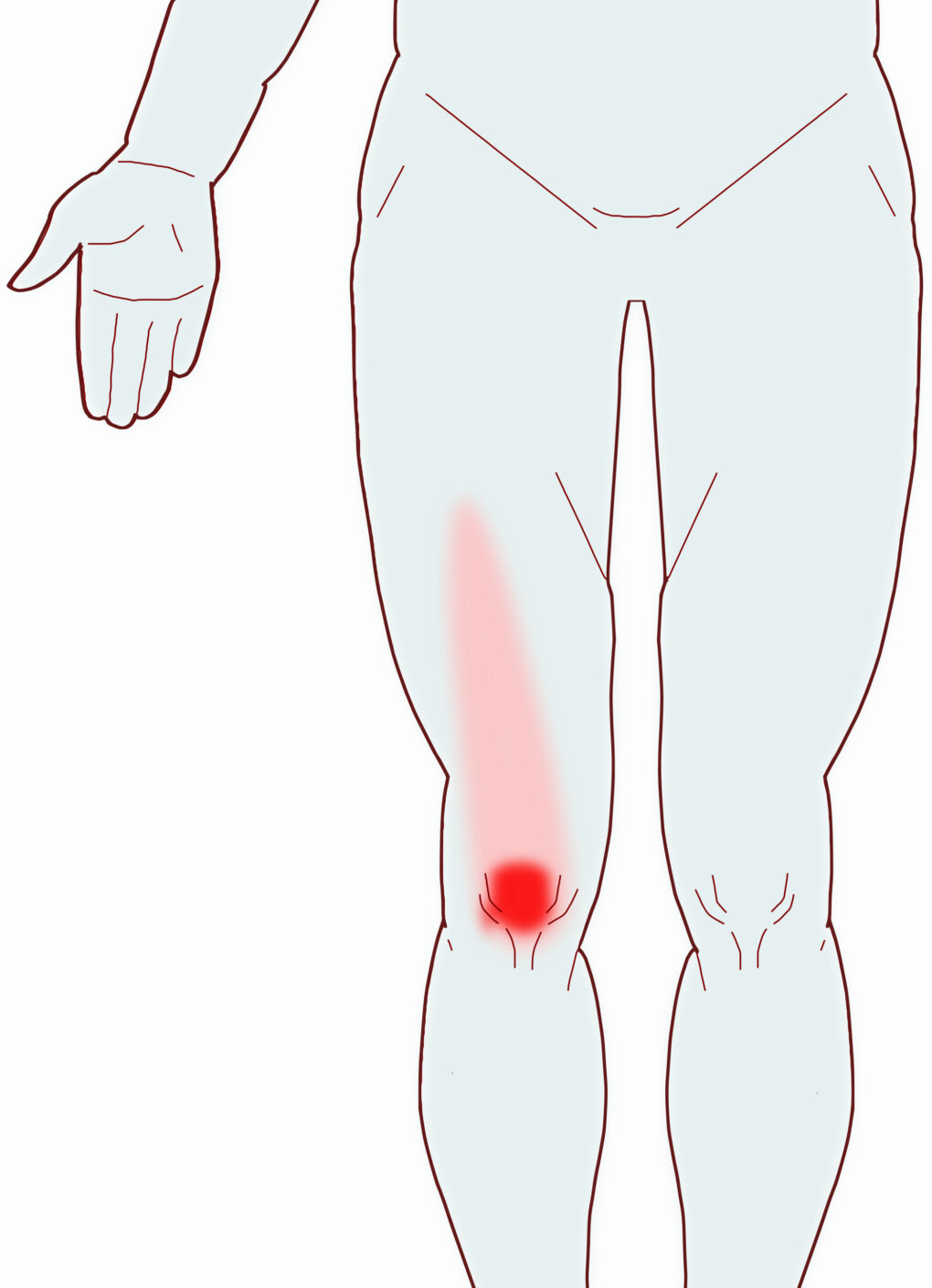Knee Pain Going Down Stairs
Table of Contents
- How People Describe This Pain Pattern
- How You Activate and Intensify This Pain Pattern
- Self-Care – Getting Relief on Your Own
- Musculoskeletal Anatomy Behind Your Pain
- Therapy Notes for Massage and Bodywork
How People Describe This Pain Pattern


Pain on Stairs
People complain of knee pain when going downstairs. This pain may cause the knee to feel weak or buckle under their weight. The pain can be sharp and surprise them, causing a fall. Incidentally, because of some common asymmetries, it happens to the left leg about twice as often.
There are several different pain patterns around the knee. This is specific to feeling like it is in or on the knee cap. Other patterns create pain to the side or under the knee cap.
Sleeping
This knee pain may also bother them while sleeping, especially when they change positions or bend the knee. This nocturnal pain also seems sharp and may alarm them. Some of these people seek medical attention to check for tears in cartilage, bone spurs, etc. Failure to find those problems leads them to bodywork.
Kneeling
Often, this bothers them while kneeling. In addition, this stretch often results in complaints about knee pain. Still, they get the pain, even when the knee does not touch the ground.
How You Activate and Intensify This Pain Pattern
Fall, Accident, Strain
Usually, this trigger point activates from a near fall that twists the leg or bumps the hip. However, some patients have no idea as to why it happened.
At times, a latent trigger point becomes much more active and painful when stressed. This could be a sudden, unexpected step. In addition, this is a common problem after heavy leg workouts, hiking, walking on unstable sand, or a day at a hilly amusement park.
Carry On! Ouch.
Often, people shake it off and carry on. It may not bother them until days later when the soreness goes away. Often, they do not concern themselves about it until they descend some stairs. Then, it produces some sharp, unexpected pain. Instead of pain on stairs, this may create pain while sleeping or kneeling, but stair pain is most common.
My experience
I fell in the driveway and landed on my back, jarring my hip. Weirdly, I didn’t hit the knee at all. I felt fine. This problem developed several days later. I had pain on the top of my knee when I went downstairs and walked downhill. Other clients have told me similar stories about this pain from hiking, tripping, auto accidents, etc.
The Musculoskeletal Anatomy Behind Your Pain
Musculoskeletal Anatomy
This post on anatomy contains the standard information about origin, insertion, function, and innervation. It also includes information on functional considerations and anomalies. This is also the place to find all posts related to this muscle.
Getting Relief on Your Own
Clinically Proven
Self-Care Strategies
Self-Care Posts have common sections to make them easy to follow and understand:
- Activities to Avoid or Change
- Strategies for Quick Relief
- Stretches and Exercise for Longer-Lasting Relief
- Yoga Corner
Therapy Notes for Massage and Bodywork
Better Bodywork
Through Shared Expertise
Therapy Notes provide details for cranial, spinal, and local joint work. These notes also link to a traditional neuromuscular protocol.
By treating integrative components first, direct work on the muscle becomes less intense while providing longer-lasting relief.
Support Integrative Works to
stay independent
and produce great content.
You can subscribe to our community on Patreon. You will get links to free content and access to exclusive content not seen on this site. In addition, we will be posting anatomy illustrations, treatment notes, and sections from our manuals not found on this site. Thank you so much for being so supportive.
Cranio Cradle Cup
This mug has classic, colorful illustrations of the craniosacral system and vault hold #3. It makes a great gift and conversation piece.
Tony Preston has a practice in Atlanta, Georgia, where he sees clients. He has written materials and instructed classes since the mid-90s. This includes anatomy, trigger points, cranial, and neuromuscular.
Question? Comment? Typo?
integrativeworks@gmail.com
Follow us on Instagram
*This site is undergoing significant changes. We are reformatting and expanding the posts to make them easier to read. The result will also be more accessible and include more patterns with better self-care. Meanwhile, there may be formatting, content presentation, and readability inconsistencies. Until we get older posts updated, please excuse our mess.